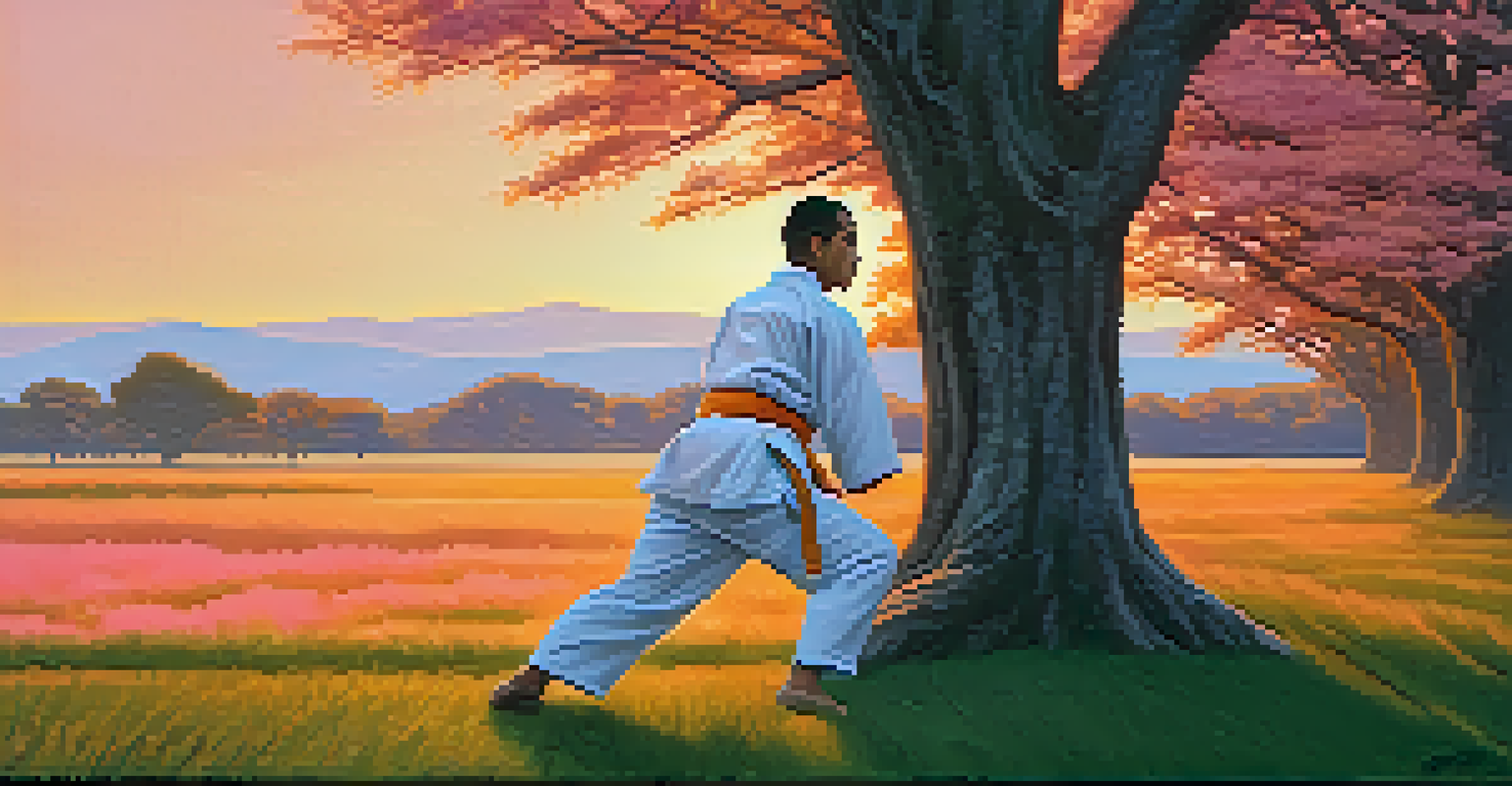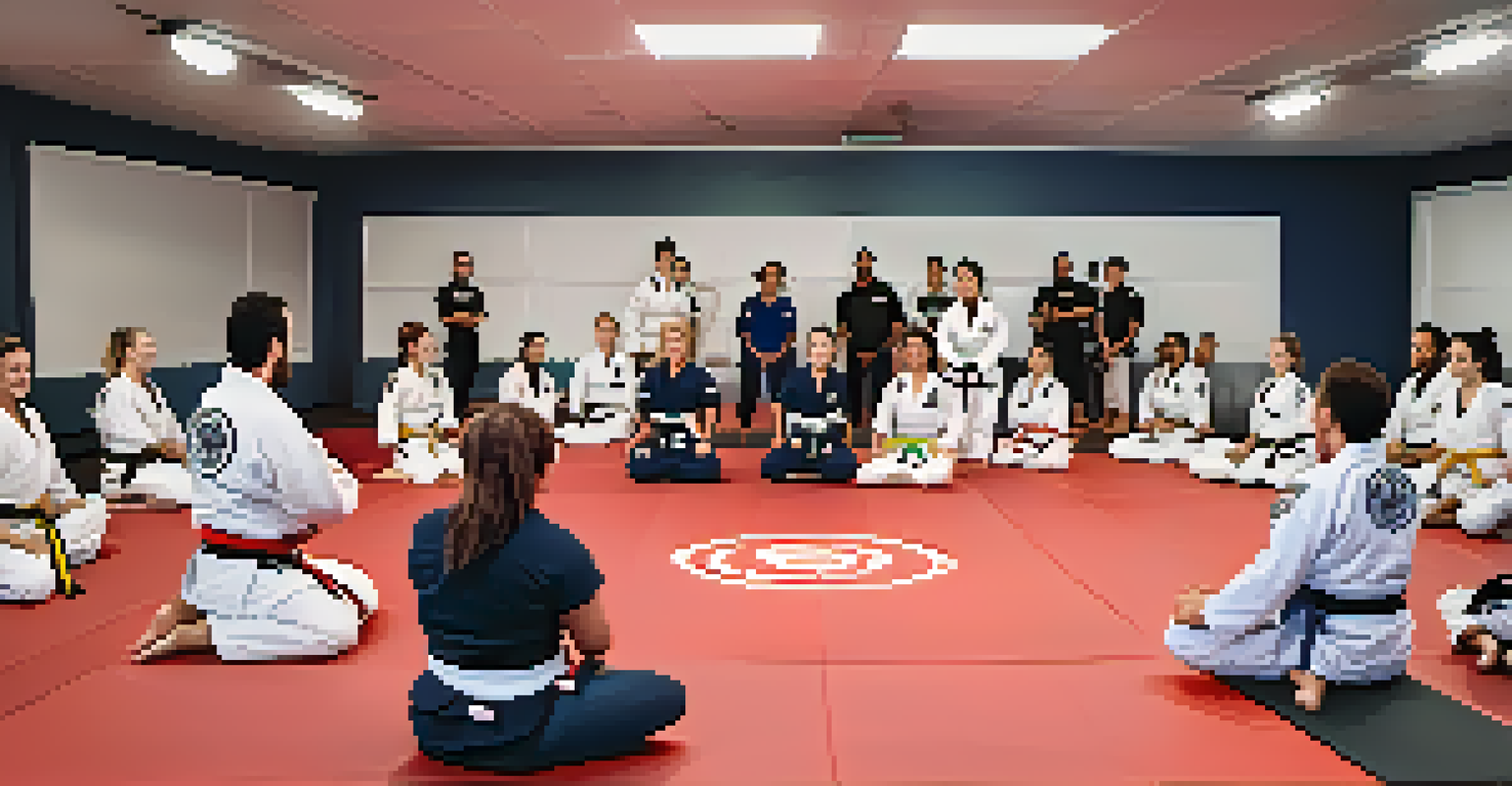Cultural Significance of Brazilian Jiu-Jitsu in Defense

The Roots of Brazilian Jiu-Jitsu and Its Historical Context
Brazilian Jiu-Jitsu (BJJ) has its origins in the early 20th century, evolving from Japanese judo and jiu-jitsu. Its journey began when Mitsuyo Maeda, a Japanese martial artist, taught the art to Carlos Gracie in Brazil. This fusion of techniques and philosophies created a unique style that emphasizes leverage and technique over brute strength.
The more I practice, the luckier I get.
As BJJ gained popularity, it became more than just a fighting style; it transformed into a cultural phenomenon. It reflects Brazil's diverse cultural heritage, integrating elements from various martial arts and local traditions. This rich background adds depth to its practice and influences its role in self-defense.
The evolution of BJJ illustrates how martial arts can adapt to cultural contexts, making it a significant part of Brazilian identity. This historical framework sets the stage for understanding its present-day implications in personal defense and social dynamics.
Empowerment Through Skill: BJJ as a Tool for Self-Defense
One of the most compelling aspects of BJJ is its emphasis on empowering individuals, particularly women, through skill acquisition. Many practitioners find that mastering BJJ techniques enhances their confidence and ability to defend themselves in real-world situations. This empowerment is a crucial factor in promoting self-defense awareness and skills.

In recent years, BJJ schools have seen a significant increase in female participation, demonstrating its appeal as a self-defense method. Women who train in BJJ learn not only physical techniques but also mental resilience and situational awareness. This holistic approach to self-defense builds a strong foundation for personal safety.
BJJ Empowers Through Skill Development
Brazilian Jiu-Jitsu enhances confidence and self-defense abilities, particularly among women, fostering personal safety through skill acquisition.
Moreover, BJJ encourages practitioners to practice with partners of varying sizes and skills. This adaptability allows individuals to learn how to handle different types of confrontations, reinforcing the idea that anyone can defend themselves, regardless of their physical stature.
Community and Belonging: The Social Aspects of BJJ
Beyond the physical skills, Brazilian Jiu-Jitsu fosters a strong sense of community among its practitioners. BJJ gyms often feel like extended families, where members support each other both on and off the mats. This camaraderie creates an environment where individuals can grow, share experiences, and feel a sense of belonging.
Strength does not come from physical capacity. It comes from an indomitable will.
Training together in a collaborative environment helps to break down social barriers, promoting inclusivity. People from diverse backgrounds come together, united by a common goal of improving their skills and learning self-defense. This melting pot of cultures and personalities enriches the overall experience of practicing BJJ.
The strong community ties also play a crucial role in reinforcing the values of respect, discipline, and perseverance. These values extend beyond the gym, influencing how practitioners approach challenges in their daily lives, ultimately enhancing their sense of security and resilience.
BJJ in Popular Culture: Influence on Defense Perceptions
The rising popularity of Brazilian Jiu-Jitsu has permeated popular culture, influencing how society perceives self-defense. From movies to social media, BJJ techniques are often showcased, highlighting their effectiveness in various scenarios. This visibility helps demystify martial arts and encourages more people to explore self-defense options.
Moreover, notable figures in the martial arts community, such as the Gracie family, have played a significant role in promoting BJJ as a viable self-defense method. Their success stories and public demonstrations have inspired countless individuals to consider BJJ for personal safety, thereby shifting cultural perceptions of self-defense.
BJJ Cultivates Strong Community Bonds
The practice of Brazilian Jiu-Jitsu creates a supportive community that promotes inclusivity and shared growth among diverse practitioners.
As more people recognize the practicality of BJJ, it fosters a broader dialogue about personal safety and self-defense education. This cultural shift emphasizes the importance of being prepared and empowers individuals to take charge of their own safety.
The Role of BJJ in Law Enforcement and Military Training
Brazilian Jiu-Jitsu has increasingly been integrated into law enforcement and military training programs, reflecting its effectiveness in real-life confrontations. Officers and soldiers benefit from BJJ techniques that focus on controlling and subduing suspects without relying on excessive force. This approach promotes safer outcomes for both the personnel and the public.
Training in BJJ equips law enforcement professionals with essential skills for handling high-stress situations. The ability to stay calm and use technique over aggression can make a significant difference during confrontations, enhancing officer safety and effectiveness. This practical application underscores the relevance of BJJ in defense tactics.
Additionally, the principles of BJJ, such as leverage and technique, are valuable not just for physical confrontations but also for conflict resolution. Officers trained in BJJ are more likely to de-escalate situations, showcasing how martial arts can positively impact community relations.
BJJ as a Lifelong Journey: Continued Learning and Adaptation
One of the most appealing aspects of Brazilian Jiu-Jitsu is that it offers a lifelong journey of learning. Practitioners often find themselves continually evolving, both in skill and mindset. This commitment to personal growth encourages individuals to view challenges as opportunities rather than obstacles, both on and off the mat.
The adaptability of BJJ techniques to various situations means that practitioners are always learning how to improve their self-defense strategies. This dynamic nature keeps training fresh and engaging, motivating individuals to stay committed to their practice. Learning becomes a shared experience, leading to deeper connections within the BJJ community.
BJJ's Growing Cultural Relevance
As Brazilian Jiu-Jitsu gains popularity, it is reshaping perceptions of self-defense and encouraging broader discussions around personal safety.
Moreover, the philosophy of continuous improvement aligns with broader life lessons about resilience and perseverance. As practitioners face difficulties in their training, they develop valuable skills that translate into everyday life, ultimately enhancing their ability to navigate challenges with confidence.
The Future of BJJ in Self-Defense and Cultural Impact
Looking ahead, the cultural significance of Brazilian Jiu-Jitsu in self-defense is poised to grow even further. As self-defense education becomes increasingly important in today’s society, BJJ offers practical solutions that resonate with diverse audiences. This trend is likely to encourage more people to explore martial arts as a means of personal protection.
The global reach of BJJ continues to expand, with schools popping up in various countries. This international growth not only promotes the art itself but also fosters cross-cultural exchanges that enrich its practice. Such interactions broaden the understanding of self-defense and create a more inclusive martial arts community.

As Brazilian Jiu-Jitsu maintains its cultural relevance, it will likely adapt to new societal needs and challenges. This ongoing evolution ensures that BJJ remains a vital tool for empowerment, self-defense, and community building for generations to come.